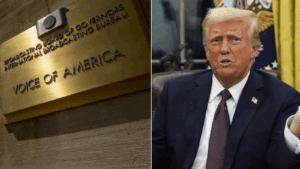Three American citizens involved in a failed coup attempt in the Democratic Republic of Congo are now back in the United States after receiving a reduction in their death sentences and individual clemency.
Congo Releases Three Americans Sentenced in Failed Coup Attempt

Congo Releases Three Americans Sentenced in Failed Coup Attempt
Three Americans previously sentenced to death in the Democratic Republic of Congo for a failed coup have been repatriated to the U.S. following clemency decisions.
The three men, identified as Marcel Malanga, Tyler Thompson, and Benjamin Zalman-Polun, were implicated in a May 2024 assault on the Congolese government, which involved violent confrontations near the presidential palace. Their death sentences were commuted to life imprisonment last week by Congo's government.
On Tuesday, following a meeting between an American delegation and Congolese President Felix Tshisekedi, the men were repatriated to the United States, as confirmed by both the Congolese presidency and the U.S. State Department. The nature and location of their imprisonment in the U.S. remain unclear, with the Justice Department not providing additional comments.
The President of the Democratic Republic of Congo has indicated interest in collaborating with the U.S. on mineral wealth amidst ongoing internal conflicts with armed groups in the eastern region of the country, specifically engaging with groups like M23, which is reportedly backed by Rwanda.
In a previous statement, Trump's special envoy for hostages, Adam Boehler, had drawn attention to the tie between the situation of these American citizens and the conflict, hinting at the complex political landscape that surrounds these developments.
The coup attempt last May reportedly led to the death of the coup leader, Christian Malanga, who engaged in the attack while livestreaming the events. Marcel Malanga, who is the leader's American son, has asserted that he neither planned the coup nor was there to participate voluntarily.
The geopolitical implications of these events continue to unfold as the United States explores new partnerships in the Congolese mineral sector, aiming to secure resources critical for its renewable energy goals, where China currently holds a dominant position.
On Tuesday, following a meeting between an American delegation and Congolese President Felix Tshisekedi, the men were repatriated to the United States, as confirmed by both the Congolese presidency and the U.S. State Department. The nature and location of their imprisonment in the U.S. remain unclear, with the Justice Department not providing additional comments.
The President of the Democratic Republic of Congo has indicated interest in collaborating with the U.S. on mineral wealth amidst ongoing internal conflicts with armed groups in the eastern region of the country, specifically engaging with groups like M23, which is reportedly backed by Rwanda.
In a previous statement, Trump's special envoy for hostages, Adam Boehler, had drawn attention to the tie between the situation of these American citizens and the conflict, hinting at the complex political landscape that surrounds these developments.
The coup attempt last May reportedly led to the death of the coup leader, Christian Malanga, who engaged in the attack while livestreaming the events. Marcel Malanga, who is the leader's American son, has asserted that he neither planned the coup nor was there to participate voluntarily.
The geopolitical implications of these events continue to unfold as the United States explores new partnerships in the Congolese mineral sector, aiming to secure resources critical for its renewable energy goals, where China currently holds a dominant position.























